European nations mixed in their response to virus spikes
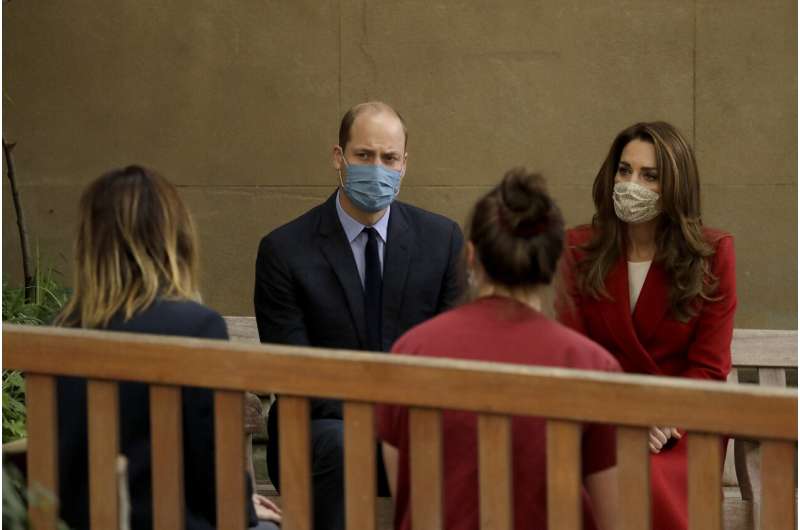
Countries across Europe are battling coronavirus infection spikes with new lockdowns, curfews, face mask orders and virus tracking smart phone apps.
In a small sign of success, Spain's government said it won't extend a state of emergency in the Madrid region when it expires Saturday, but will look to more local measures.
But as the second wave of the global pandemic sweeps across the continent, local and national governments also are facing swelling opposition to the new measures.
In The Hague, bar and restaurant owners launched a legal challenge Tuesday to an order to close their doors for at least four weeks. Bar owners in Berlin instigated a similar case last week. An outcry in Portugal has forced authorities to back away from a plan to make a tracing app mandatory nationwide.
Amid the public frustration, some countries are dangling a festive carrot in front of virus-weary populations, saying that tough action now could clear the way for an easing of measures before Christmas.
German Chancellor Angela Merkel invoked the holiday period over the weekend and other countries are following suit. Merkel told her country: "What winter will be like, what our Christmas will be like, will be decided in these coming days and weeks."
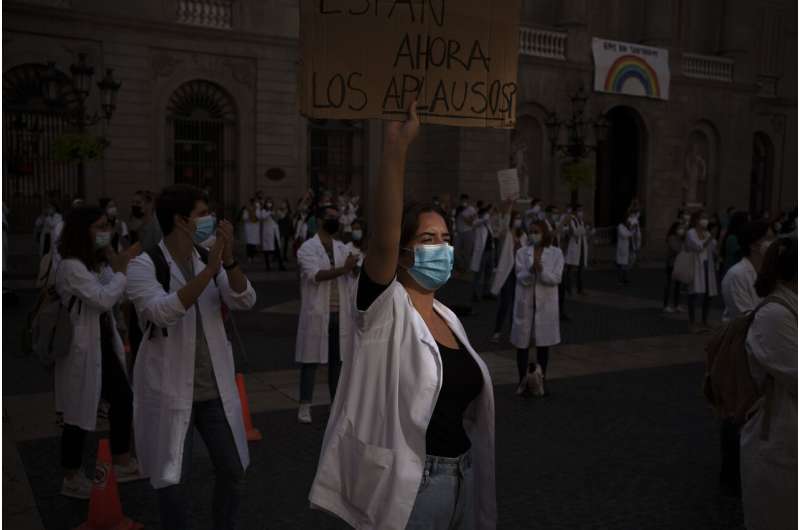
___
SPAIN
Health Minister Salvador Illa said Tuesday the government won't extend the state of emergency in the Madrid region when it expires Saturday, but it may begin introducing curfews at COVID-19 hotspots around the country.
Illa said the partial lockdown in the Madrid area in recent weeks had helped put a lid on community transmission that made it one of Europe's most significant coronavirus clusters.
He noted, however, that Madrid's number of cases is still high. The region has reported more than 29,000 cases over the past two weeks, though its tally on Tuesday was 354 new cases in 24 hours—Spain's fourth-highest rate.
Illa said he is assessing with Spain's regional governments the possibility of agreeing on targeted curfews, as the country approaches the milestone of 1 million officially recorded cases.
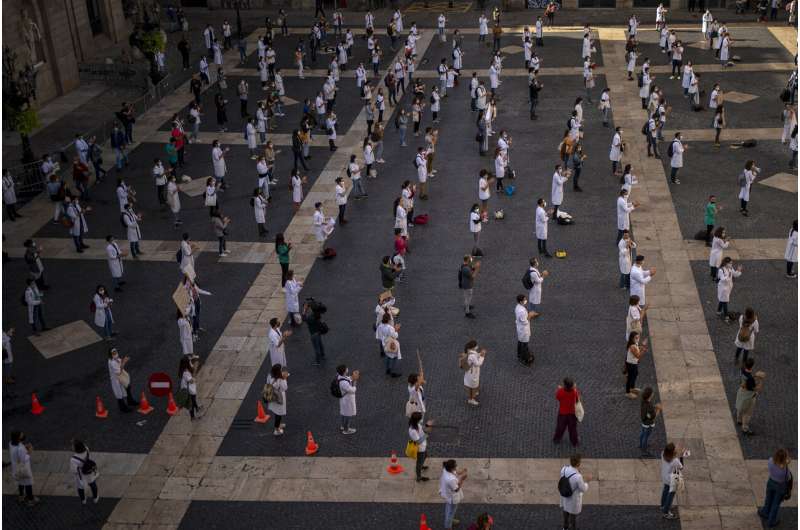
"I want to be very clear," Illa said. "Some very hard weeks are coming."
IRELAND
Prime Minister Micheal Martin announced a tough new lockdown. From midnight Wednesday, non-essential shops must close, restaurants will be limited to takeout, people must stay within five kilometers (three miles) of their homes and visits to other households are banned.
It's a near-return to the severe restrictions imposed by the government in March, although schools, construction sites and manufacturing industries will remain open. Martin said that if people complied with the restrictions, which will be in place until Dec. 1, the country would be able to celebrate Christmas "in a meaningful way."
Ireland, which has a population of almost 5 million, has recorded 1,852 coronavirus deaths.
BRITAIN
Prime Minister Boris Johnson's government is resisting a recommendation from its scientific advisory committee for a short "circuit-breaker" lockdown to curb the spread of the coronavirus.
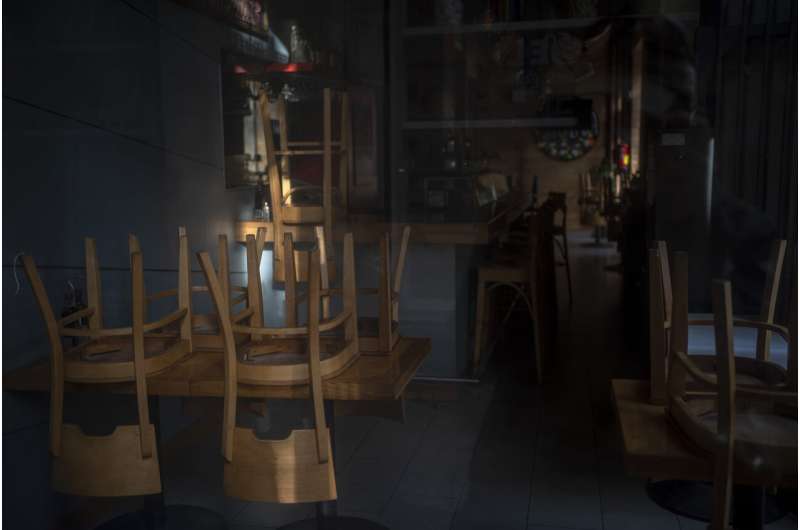
Instead, it has adopted a three-tier system for England, with areas classed as medium, high of very high risk. In the top tier, pubs have to close and people are barred from mixing with members of other households.
So far, only the Liverpool and Lancashire regions of northwest England have been placed in the highest tier. Nearby Greater Manchester, with a population of almost 3 million, has been holding out for more support for workers and businesses affected by the restrictions.
The other nations of the U.K. control their own health policies and are taking slightly different approaches.
THE NETHERLANDS
A lawyer representing more than 60 bars and restaurants warned a court in The Hague that the Dutch hospitality industry faces "a tidal wave of bankruptcies" caused by a lockdown order for them to close their doors for at least four weeks.
Lawyer Simon van Zijll called the closure order, part of a "partial lockdown" imposed last week "random and disproportionate" as he urged a judge in a summary procedure to allow bars and restaurants to reopen.
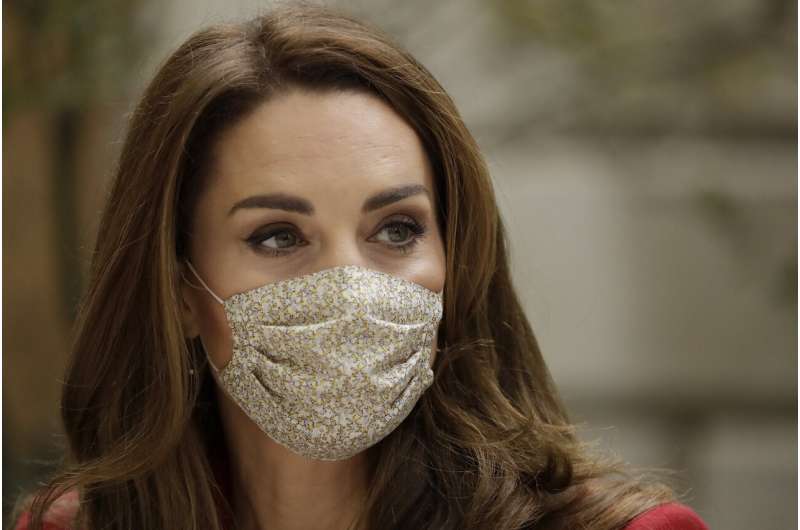
Government lawyer Reimer Veldhuis rejected the claim that the four-week closure for bars and restaurants was arbitrary, saying it was part of a broader package of carefully considered measures that affects many other sections of society.
The Netherlands has one of Europe's highest rates of infections in the second wave of the virus.
PORTUGAL
The national government wanted to make its COVID-19 tracing app mandatory, but a broad outcry has forced it to back down from the plan which was widely criticized as unworkable and unconstitutional.
Prime Minister Antonio Costa said in a television interview late Monday that the widely contested move, which was due to go to a vote later this week in parliament, required further debate.
Parliament is expected on Friday to make the wearing of face masks mandatory outdoors.
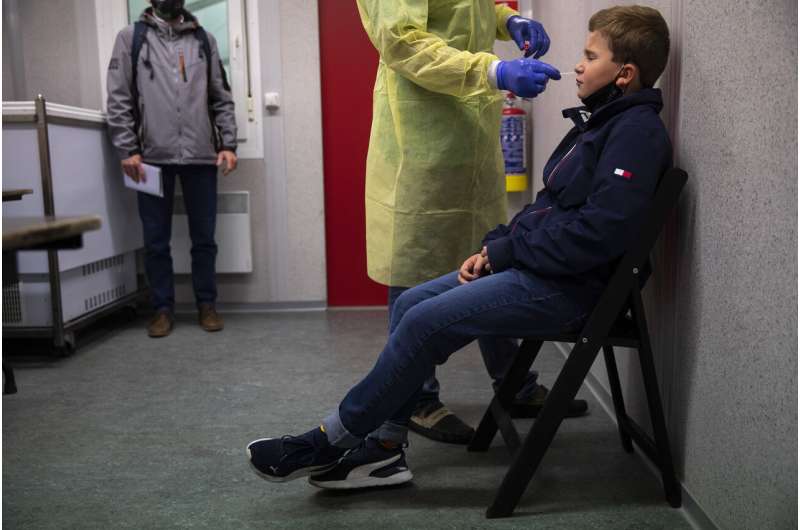
HUNGARY
The country recorded its highest ever number of coronavirus deaths on Tuesday as 38 patients succumbed to the illness, pushing the total number of confirmed COVID-19 fatalities to 1,211.
The central government in Budapest has canceled most events planned for the Oct. 23 national holiday and called on local municipalities to follow suit. The festive period in Hungary already has taken a hit—the Christmas Fair in the capital, one of the largest and most visited in central and eastern Europe, has also been canceled.
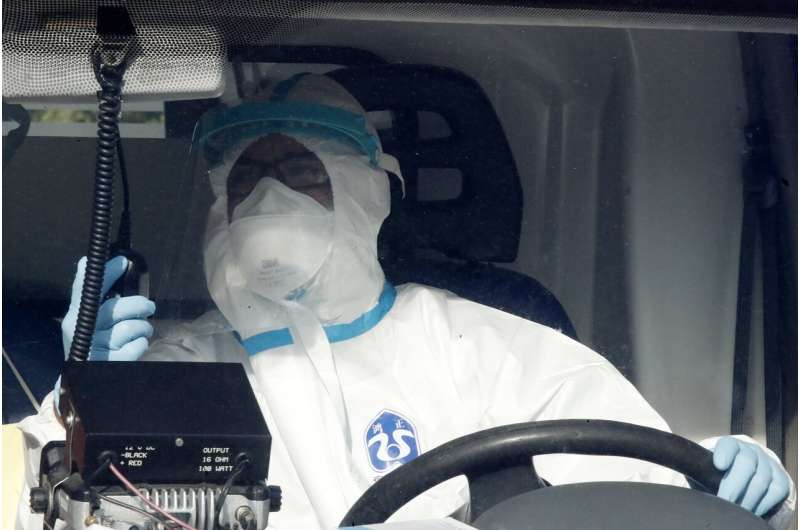
CZECH REPUBLIC
Facing a record surge of infections, the Czech Republic is returning to a recipe that helped contain the pandemic in the spring. Health Minister Roman Prymula said that face masks will be again mandatory outdoors from Wednesday.
"The colder the weather is, the more important it is to have a face mask outdoors," Prymula said.
© 2020 The Associated Press. All rights reserved. This material may not be published, broadcast, rewritten or redistributed without permission.



















